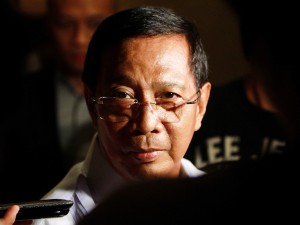Binay’s office barred from getting reports on OFW cases
MANILA, Philippines—The Philippine Embassy in Kuwait has been barred from directly sending information on cases of Filipino migrant workers to Vice President Jejomar Binay, a “disappointing” directive that has slowed down his office’s response to overseas Filipino workers cases it receives every day.
Citing a copy of the urgent memorandum, the Office of the Vice President (OVP) said the prohibition was directed by Ambassador Esteban Conejos last July, just before he left the Department of Foreign Affairs’ Office of the Undersecretary for Migrant Workers Affairs (OUMWA).
Conejos was appointed the Philippines’ Permanent Representative to the World Trade Organization in the same month in 2012.
In his memo to the Kuwait post on July 11, just a few days before his posting in Geneva, Conejos cited the sensitivity and confidentiality of OFW cases in instructing the embassy to stop directly forwarding reports to the OVP and other agencies.
“As the nature of OUMWA and Post’s communications are confidential, this Office wishes to request the Post to refrain from sending direct information and updates to OVP or other agencies,” said Conejos in his memo.
“The Department recognizes the OVP’s involvement with issues of OFWs; however, it is this Office’s duty to inform or update the OVP and other gov’t agencies concerned through the appropriate communication channels,” read the memo, a copy of which the OVP sent to the Philippine Daily Inquirer.
Such protocol, said Conejos would “prevent confusion” among relatives of Kuwait OFWs involved in various cases handled by the OUMWA.
“Each case has certain particulars and peculiarities that need not be discussed with OVP especially when these involve the privacy of OFWs and their NOKs (next of kin),” said Conejos.
Assistant Secretary Raul Hernandez, department spokesperson, said he was “not aware” of such a memo.
Binay’s spokesperson Joey Salgado decried the memo, saying the OVP has always known how to handle sensitive cases. He said Binay would seek a “clarification and reconsideration” of the memo, now apparently in effect as the Kuwait post has been referring the OVP’s queries to the OUMWA back in Manila.
“We were surprised and rather disappointed. The VP would most likely ask them to explain. For one, the VP is the Presidential adviser on OFW concerns so it is important for him to be able to coordinate directly to the post,” Salgado said.
As Binay’s office handles queries and requests for assistance from OFWs and their relatives every day, a direct link to the post in Kuwait, host to a large OFW population, is crucial especially in sensitive cases, according to Salgado.
“Right now, with this directive, we have to go to OUMWA to get updates. We understand their work load but we are having a problem because it takes time for us to get their feedback,” said Salgado.
“They (OUMWA) should know that we can appreciate the sensitivity of cases, we know the protocol and we don’t make a move without coordination with OUMWA,” he said.
